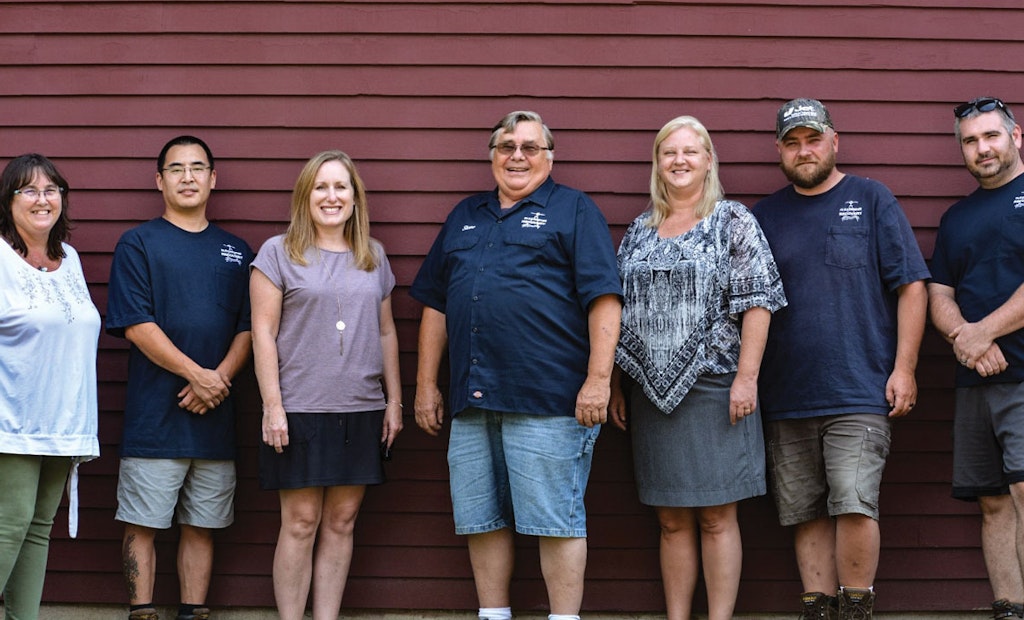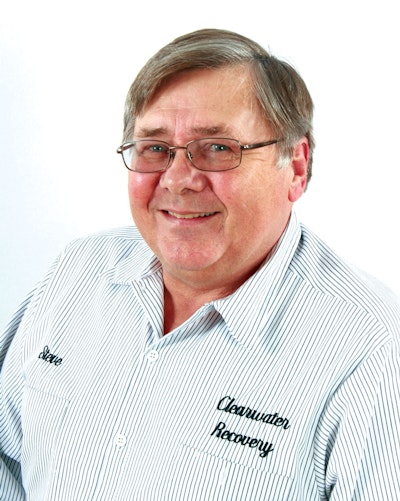
The Clearwater Recovery crew includes, from left, Laura Robinson, Dan Grant, Erin Ward, Stephen Nelson, Kellie Merry, Edward Nelson and Zach Kalaijian.
Interested in Business?
Get Business articles, news and videos right in your inbox! Sign up now.
Business + Get AlertsName and title or job description: Stephen Nelson, president
Business name and location: Clearwater Recovery, Rockland, Massachusetts
Services we offer: We specialize in operations and maintenance service for alternative advanced treatment units. We’re a distributor for Jet in Massachusetts but we service pretty much any of the aerobic systems.
Age: 73
Years in the industry: I’ve been doing this since I was about 12, working for my dad. He was a residential homebuilder and did a lot of septic installs. I did installations for probably 30 years. Occasionally we’d get into a recession, and when I turned 40 there was no work to be had. I went to work at a treatment plant and did that for eight years, which I really liked. Then in 1995 Massachusetts revised their septic code and started talking about the innovative systems. Timing-wise it was good for me because by then I had met a lot of the manufacturers. I told Jet I thought I could get their treatment system approved in Massachusetts. I spent the next two years sending the Massachusetts Department of Environmental Protection enough literature that they finally did approve them. I started Clearwater Recovery in 1997.
Association involvement: I joined the Yankee Onsite Wastewater Association when they started in 2006. I haven’t had time to be as active as I’d like but I am on the board of directors and have tried to recruit people. All my employees are members. I’m also getting more involved with the National Onsite Wastewater Recycling Association which I joined in 1998. And I spent 22 years on the local board of health, which was important because I’d go to seminars and network with health agents and board members.
Benefits of belonging to the association: One of the biggest benefits is the courses we offer for continuing education, which more and more towns are requiring. Massachusetts doesn’t do a lot with counties like most states do. Each town has what they call home rule. We have 351 towns that can each add their own rules to the state regulations. We’re trying to standardize that a little bit.
Biggest issue facing your association right now: There’s a labyrinth of rules and regulations at the state level. And now there’s a new mandate coming down regarding nitrogen removal, causing a huge outcry from homeowners. That outcry also happened in 1995 when the code was revised — which I understand, but that revision opened up opportunities for people with the innovative/alternative systems. The best part of that is we can make permanent repairs to septic systems. Back in the day, I had places I’d go every three or four years and just add a new leach trench. It’s not done that way anymore. So I think it’s an improvement. I just think the state could be a little less heavy-handed with how they do things.
Our crew includes: In the field are my son Ed Nelson, Zach Kalaijian and Dan Grant, all licensed operators. In the office we have our office manager Laura Robinson and administrative assistants Kellie Merry and Erin Ward. We also work with a number of independent operators, pump technicians and pumping companies.
Typical day on the job: I do all the accounts payable. I work with Laura on scheduling and alarm responses. I make sales calls and do a little bit of consulting. We’ve been working with alternative systems for 26 years. We get calls from engineers and others asking, “What do you think of this idea?” and I’m always happy to meet with them. And I still like to get out and run the equipment when I can. I’d rather be outdoors than indoors.
The job I’ll never forget: We just finished a job at my brother’s summer cottage. It’s on a freshwater pond and has a 40% slope to the waterfront. We were about 25 feet from the water’s edge and there were three private wells barely 50 feet from the proposed leachfield. We designed an alternative system to minimize the size of the leachfield and used a plastic Jet tank alternative with an Infiltrator leachfield.
My favorite piece of equipment: I bought a Kubota L47 backhoe six years ago to do soil evaluations. That’s the best backhoe I’ve ever operated. When I run it, I call it backhoe therapy.
Most challenging site I’ve worked on: Some of the sites we run into in Plymouth, Massachusetts, are either all sand or you must excavate 30 feet of silt loam to get down to sand and then refill the site. We did a site that had 30 feet of clay. We did find sand but couldn’t excavate it because by the time we did that it probably would have taken the house into the hole. By then there were several systems that allowed you to use the B subsoil horizon. We worked with Anua and installed their peat filters on a sand bed on the subsoil. That system has been functional for more than 10 years.
Oops, I wish I could take this one back: Some drip irrigation systems have proven to be problematic and not easily fixed. It’s a real challenge to correct the issues after everything’s been installed. I think drip irrigation has its place but it shouldn’t be placed everywhere.
The craziest question I’ve been asked by a customer: I often get the question from people with systems past their prime and no longer functional — “Is there anything I can do?” The answer is, “Yes. You will probably need a new system.”
If I could change one industry regulation, it would be: Massachusetts requires a comprehensive Title V inspection at the time of property transfer, which is very involved and expensive — $500-plus. I would change that for advanced systems. We have clients who have kept to their service schedule where we go out twice a year and do almost a complete Title V inspection so I don’t think they should have to do that at time of transfer.
Best piece of small business advice I’ve heard: My dad always said, “Pay your bills right away, they don’t get any smaller sitting on the desk.”
If I wasn’t working in the wastewater industry, I would: I’ve worked in different aspects of this industry my whole life and I can’t think of any place I’d rather be.
Crystal ball time – This is my outlook for the wastewater industry: In our state, the outlook is good. Going to the next level of nutrient removal and treatment levels is a good thing. And once things calm down about these new regulations coming up, I think we’re into a whole new phase and we’ll see an improved outlook. We’re also getting a better handle on keeping qualified people in the industry. Requiring continuing education is not a bad thing. It keeps it more professional.
- Compiled by Betty Dageforde






